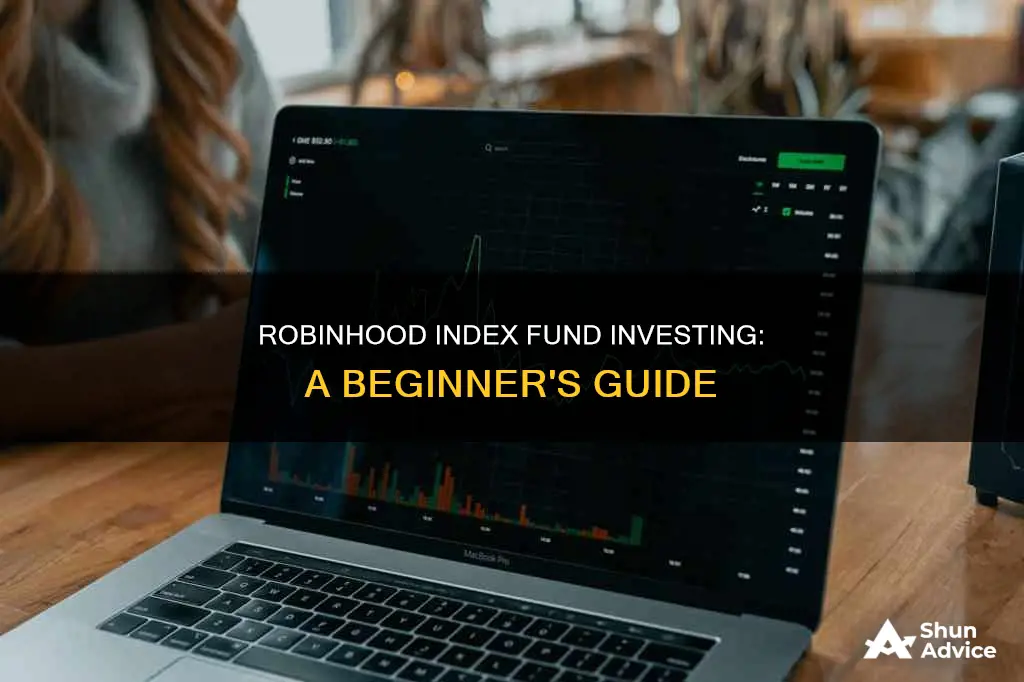
Index funds are a great way to invest in the stock market without the hassle of picking individual stocks. They are a low-cost, passive way to invest, as they have very low expense ratios. Robinhood offers a number of index funds to its users, such as the Vanguard Total Stock Market Index Fund (VTI) and the SPDR S&P 500 ETF (SPY). In this article, we will discuss the benefits of investing in index funds on Robinhood and provide a step-by-step guide on how to get started.
Benefits of Investing in Index Funds on Robinhood
- Low cost: Index funds on Robinhood have very low expense ratios, allowing you to keep more of your investment earnings.
- Diversification: Index funds are diversified, which means your investment is spread across a variety of stocks, reducing your risk.
- Passive management: Index funds are passively managed, which means they do not try to beat the market, potentially reducing your fees and volatility.
How to Invest in Index Funds on Robinhood
Investing in index funds on Robinhood is a simple and straightforward process. Here are the steps you need to follow:
1. Open a Robinhood account: If you don't already have an account, you will need to create one by downloading the app or signing up on their website.
2. Fund your account: Connect your bank account and transfer money into your Robinhood account. There is no minimum amount required to open an account.
3. Find the index fund you want: Use the search bar on the Robinhood app or website to search for the specific index fund you want by its ticker symbol or name.
4. Choose the number of shares: Decide how many shares you want to purchase and review the estimated cost.
5. Review and confirm your order: Review the order details, including any associated fees, and confirm your order.
6. Wait for order execution: Robinhood will provide real-time updates on the status of your order.
7. Track your investment: Once your order is completed, you can find your purchased index fund in your portfolio and track its performance over time.
Remember to do your research and understand the risks involved before investing in index funds or any other financial product.
| Characteristics | Values |
|---|---|
| Number of users | 22.4 million as of 2021 |
| Fee structure | Zero-fee |
| Investment options | Index funds, stocks, ETFs, options, cryptocurrencies |
| Available index funds | Vanguard Total Stock Market Index Fund (VTI), SPDR S&P 500 ETF (SPY), iShares Core S&P 500 ETF (IVV), Vanguard Total International Stock Index Fund (VXUS), iShares Core MSCI Emerging Markets ETF (IEMG), Vanguard Total Bond Market Index Fund (BND), iShares Core US Aggregate Bond ETF (AGG), Vanguard Total International Bond Index Fund (BNDX), iShares Core Total USD Bond Market ETF (IUSB), Schwab US Aggregate Bond ETF (SCHZ), Vanguard Growth Index Fund (VUG), SPDR S&P 500 Growth ETF (SPYG), iShares International Dividend Growth ETF (IGRO), Vanguard Value Index Fund (VTV) |
| Available ETFs | Vanguard Total Market ETF (VTI), SPDR Dow Jones Industrial Average ETF (DIA), Global X DAX Germany ETF (DAX) |
| Advantages | Commission-free trading, user-friendly interface, educational resources, broad market exposure, instant diversification, lower expense ratios |
What You'll Learn

What is an index fund?
An index fund is a type of mutual or exchange-traded fund (ETF) that tracks the performance of a market index, such as the S&P 500, by holding the same stocks or bonds or a representative sample of them. Index funds are defined as investments that mirror the performance of benchmarks like the S&P 500 by mimicking their makeup. These funds are passively managed, meaning they don't have teams of analysts and portfolio managers trying to beat the market. This results in lower costs, leaving more of the return for the fund's investors.
Index funds are based on a preset basket of stocks or an index. Fund managers aim to replicate the index without active management. They track popular indexes, which are often referenced in financial news as indicators of overall market performance, giving investors insights into the performance of stocks as a whole.
Index funds are a popular choice for investors seeking low-cost, diversified, and passive investments that happen to outperform many higher-fee, actively traded funds. They are ideal for long-term investing, such as retirement accounts. While they offer advantages like lower risk through diversification and long-term solid returns, index funds are also subject to market swings and lack the flexibility of active management.
Index funds are generally safer than individual stocks because of their inherent diversification. They track a specific market index, such as the S&P 500, which means they contain a broad range of stocks across various sectors. If a single company performs poorly, that hurts you if that's a big part of your portfolio. But if it's the S&P 500 index, it's just one of hundreds in your index fund.
Index funds are good investments for beginners because you don't need to know much about investing or financial markets to do well. They are a simple, cost-effective way to hold a broad range of stocks or bonds that mimic a specific benchmark index, meaning they are diversified. Index funds have lower expense ratios than most actively managed funds, and they often outperform them, too.
Life Investment Funds: Your Best Long-Term Investment Option
You may want to see also

How to open and fund your Robinhood account
To open and fund your Robinhood account, follow these steps:
Step 1: Set up an account
Go to Robinhood's sign-up page and click "open an account." Here, you will provide an email address and password, followed by your legal name as it appears on a government ID. You will then fill in some basic information, such as your phone number, date of birth, residential address, and citizenship.
Step 2: Verify your identity
Robinhood will ask for your Social Security number to verify your identity. If you are hesitant to give out this information, be aware that the app is encrypted, and the number will be transmitted securely. All broker-dealers are required by law to collect SSNs to ensure you are not a known money launderer or terrorist.
Step 3: Provide your investing experience
This section asks about your investing experience. You will indicate whether you have no experience, some experience, more than average experience, or expertise in investing. You will also be asked if you would like to enable commission-free options trading, which can be complicated for beginners but may be of interest to experienced investors.
Step 4: Provide your employment information
You will be asked to provide your employment information and whether you or a family member is employed by a member firm of a stock exchange or the Financial Industry Regulatory Authority (FINRA). Additionally, you will be asked if you or a family member is a director, 10% shareholder, or senior officer of a publicly traded company.
Step 5: Review agreements
Robinhood will ask you to review and agree to two agreements: the Tax Certification and the brokerage agreement.
Step 6: Fund your account
You can fund your Robinhood account with as little as $1. You can link your bank account through Plaid or choose from a list of financial institutions. If you don't see your bank on the list, you can fund your account later through the Robinhood app. You can get up to $1,000 instantly after initiating a bank deposit, unless you have Robinhood Gold, in which case your limit could be between $5,000 and $50,000.
Other Things to Keep in Mind:
- There are no fees for opening, maintaining, or trading on a Robinhood account.
- Robinhood Gold is a premium service offered by Robinhood for $5 per month, providing additional features such as a higher interest rate on uninvested cash, professional research, a line of credit, and larger deposit amounts.
- Robinhood requests personal information, including financial and tax identification information, to comply with US government laws and FINRA rules.
Strategic Investing: Maximizing Returns with Closed-End Funds
You may want to see also

How to buy an index fund on Robinhood
Index funds are a great way to invest in the stock market without the hassle of picking individual stocks. They are also a low-cost way to invest, as they typically have very low expense ratios. Robinhood offers a number of index funds that are available to its users. If you are looking for a low-cost, passive way to invest in the stock market, then index funds on Robinhood are a great option.
- Open the Robinhood app or website and log in to your account. If you don't have an account, you will need to create one.
- Navigate to the search or explore function within the app.
- Search for the specific index fund you want to buy by its ticker symbol or name. You can type the ticker symbol into the search bar, or simply type "index fund" to see a list of options.
- Review the available options and select the desired index fund from the search results.
- Click on the "Trade" or "Buy" button associated with the selected index fund.
- Specify the number of shares or the dollar amount you wish to invest in the index fund.
- Choose the order type (market or limit) based on your preference and the current market conditions.
- Review the order details, including the estimated cost and any associated fees.
- If everything is accurate, click the "Review" or "Confirm" button to submit your order.
- Wait for the order to be executed. Robinhood will provide real-time updates on the status of your order.
- Once the order is completed, you will receive a confirmation notification.
- You can now find your purchased index fund in your portfolio, where you can track its performance over time.
Although it may seem like a lot of steps, the process is quite simple and straightforward. By following these steps, you can easily buy an index fund on Robinhood and start investing in the stock market with a low-cost, passive approach.
Convince Your Family to Invest in Hedge Funds
You may want to see also

The differences between ETFs and index funds on Robinhood
While there aren't many differences between ETFs and index funds on Robinhood, there are some finer details to note. On the platform, ETFs and index funds differ in structure and trading methods.
Structure
ETFs are structured as tradable securities that can be bought and sold on stock exchanges throughout the trading day. ETF prices fluctuate based on supply and demand in real time, while index funds are priced at the end of the day based on their Net Asset Value (NAV).
Trading Flexibility
ETFs can be traded throughout the trading day on Robinhood, allowing investors to buy or sell shares at prevailing market prices. This provides intraday trading flexibility, enabling investors to take advantage of market movements. Index funds, however, can only be traded at the end of the trading day once the NAV is determined.
Cost Structure
While both ETFs and index funds can have expense ratios associated with them, ETFs on Robinhood are typically offered with a zero-commission structure. This means investors can buy and sell ETF shares on Robinhood without incurring trading fees. Index funds may have transaction fees or minimum investment requirements set by the fund provider.
Investment Options
Robinhood offers a wide selection of ETFs that cover various asset classes, sectors, and market indices. These ETFs allow investors to gain exposure to specific market segments or invest in broad-based indices. The platform primarily offers a diverse range of ETF options, which may result in a limited availability of index funds on Robinhood.
Despite these differences, it's worth noting that ETFs and index funds share similar investment characteristics. In fact, most ETFs and mutual funds are index funds. The fund's structure primarily determines its definition.
Mutual Funds Philippines: Best Time to Invest
You may want to see also

The best index funds on Robinhood
Index funds are a great way to invest in the stock market, especially for beginners. They are low-cost, diversified investments that mirror the performance of a particular stock market index, like the S&P 500.
Robinhood is a popular investing platform with over 22.4 million users as of 2021. The platform offers a variety of index funds that trade as exchange-traded funds (ETFs). Here are some of the best index funds available on Robinhood:
Vanguard S&P 500 ETF (VOO)
The Vanguard S&P 500 ETF is one of the most popular ETFs on Robinhood and the third-biggest ETF in the world based on assets under management. It tracks the S&P 500 index, which consists of 500 of the largest publicly traded U.S. companies. With a low expense ratio of 0.03%, this ETF is a favourite of legendary investor Warren Buffett, who has recommended it and even plans to allocate 90% of his wife's investment portfolio to it after his death.
SPDR S&P 500 ETF Trust (SPY)
The SPDR S&P 500 ETF Trust is the second most popular ETF on Robinhood and the largest ETF on the market with over $380 billion in assets under management. It is managed by State Street and was the first ETF listed in the U.S. back in 1993. The SPY ETF aims to track the performance of the S&P 500 index but comes with a slightly higher expense ratio of 0.0945%.
Vanguard Total Stock Market Index Fund ETF (VTI)
Another Vanguard ETF, the Vanguard Total Stock Market Index Fund ETF, is the third most popular on Robinhood and the fourth-largest ETF based on assets under management. Unlike the previous two, this ETF tracks the CRSP US Total Market Index, which includes nearly 4,000 stocks across large-cap, small-cap, and even micro-cap stocks. With a low expense ratio of 0.03%, this ETF provides broad diversification across the market-cap spectrum.
IShares China Large-Cap ETF (FXI)
For those interested in investing in China, the iShares China Large-Cap ETF provides exposure to large-cap Chinese companies. This ETF can be a great choice if you are bullish on China's future growth prospects.
SPDR Dow Jones Industrial Average ETF (DIA)
The SPDR Dow Jones Industrial Average ETF allows investors to track the performance of the Dow Jones Industrial Average, which includes 30 blue-chip U.S. stocks. This ETF has been around since 1998 and has tens of billions in assets under management.
Global X DAX Germany ETF (DAX)
For exposure to the German stock market, the Global X DAX Germany ETF tracks the DAX index, which consists of 30 of the top large-cap stocks in Germany.
These are just a few examples of the best index funds available on Robinhood. When choosing an index fund to invest in, it's important to consider factors such as the fund's expense ratio, diversification, historical performance, and how closely it tracks the underlying index. It's also crucial to have a long-term investment horizon, as index funds are typically meant to be held for the long term.
Passive Index Funds: A Simple Guide to Getting Started
You may want to see also







